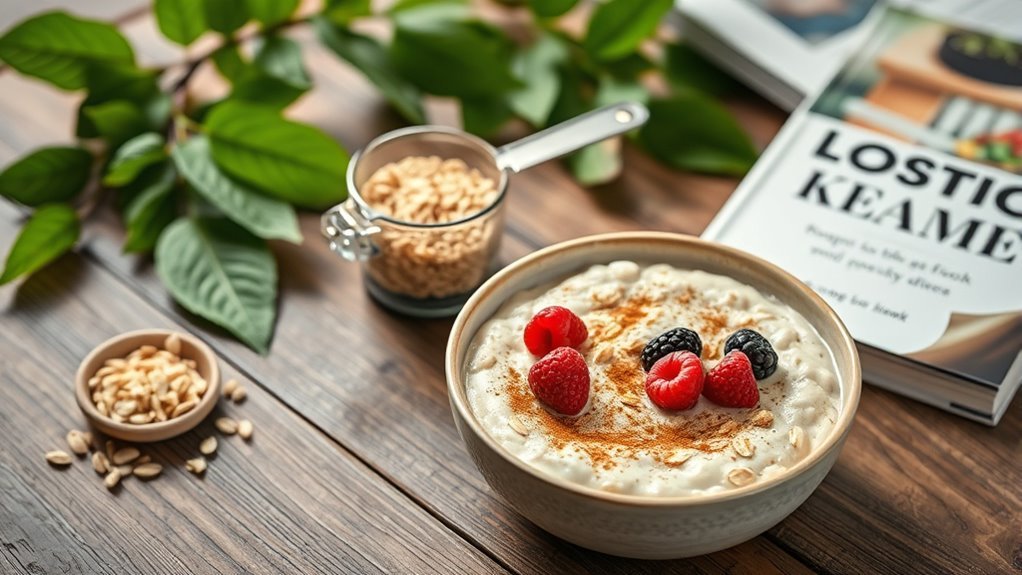Oats aren’t considered keto-friendly because they contain about 27 grams of carbohydrates per serving, which can hinder your ability to maintain ketosis. While they offer fiber and essential nutrients, their high carb content may exceed your daily limits on a ketogenic diet. Moderation is essential, and you might want to explore lower-carb alternatives like chia pudding or almond flour instead. If you’re curious about making suitable choices for your keto plan, there’s more to uncover.
Understanding the Ketogenic Diet

When you explore the ketogenic diet, you’ll discover it’s more than just a trendy eating plan; it’s a well-researched approach that alters your body’s metabolism. The ketogenic principles focus on drastically reducing carbohydrates and replacing them with dietary fats, prompting your body to enter a state of ketosis. In ketosis, your body shifts from burning glucose for energy to utilizing fat, which can lead to weight loss and improved mental clarity. This high-fat, low-carb diet encourages you to embrace healthy fats, such as avocados, nuts, and olive oil, while minimizing sugar and starches. Understanding these foundational principles empowers you to make informed choices, granting you the freedom to tailor your meals according to your health goals while enjoying delicious foods.
Nutritional Profile of Oats

Oats are a nutritional powerhouse, offering a rich array of health benefits that make them a popular choice for many diets. They’re packed with oat protein, which supports muscle repair and growth, making them a great addition to your meals. Furthermore, oats are high in oat fiber, which promotes digestive health and helps you feel fuller longer. This combination of protein and fiber can aid in weight management and stabilize blood sugar levels. Additionally, oats are a good source of essential vitamins and minerals, including magnesium and B vitamins, which contribute to overall well-being. Including oats in your diet can provide you with sustained energy, making them a versatile choice for breakfast or snacks.
Carbohydrate Content and Its Impact

Although oats are celebrated for their numerous health benefits, their carbohydrate content can pose challenges for those following a ketogenic diet. A typical serving of oats contains about 27 grams of carbohydrates, which can appreciably impact your daily carb limit. However, not all carbs are created equal. Oats are rich in oat fiber, which can help mitigate the carbohydrate impact by promoting satiety and aiding digestion. Still, if you’re looking to maintain ketosis, it’s vital to monitor your overall carbohydrate intake. You might consider lower-carb alternatives or adjust your portion sizes accordingly. Balancing your love for oats with your keto goals requires mindfulness, but you can still enjoy their benefits with thoughtful planning.
Oats and Ketosis: What You Need to Know
For those traversing the intricacies of a ketogenic diet, understanding how oats fit into the picture can be challenging. While oats offer various health benefits, like fiber and antioxidants, they also present some keto misconceptions. Let’s break down what you need to know:
| Aspect | Details |
|---|---|
| Carbohydrate Count | Oats are high in carbs, around 27g per serving |
| Fiber Content | Rich in soluble fiber, aiding digestion |
| Nutritional Value | Loaded with vitamins and minerals |
| Impact on Ketosis | Can hinder ketosis if overconsumed |
| Serving Size | Moderation is key for keto dieters |
Understanding these aspects helps clarify oats’ role in your diet. Choose wisely to maintain your keto lifestyle without sacrificing your health.
Alternatives to Oats on a Keto Diet
When you’re maneuvering a keto diet, finding suitable alternatives to high-carb foods like oats is essential to stay within your carbohydrate limits. Here are three great options to contemplate:
- Chia Pudding: Combine chia seeds with unsweetened almond milk for a fiber-rich, low-carb breakfast that keeps you full.
- Almond Flour: Use almond flour in pancakes or as a base for keto-friendly baked goods. It’s low in carbs and high in healthy fats.
- Coconut Flour: This alternative is another fantastic low-carb option. It’s great for baking and can be used in various recipes.
These alternatives can help satisfy your cravings while keeping you on track with your keto lifestyle. Embrace the freedom to enjoy delicious meals without the carbs!
Final Thoughts on Including Oats in Your Keto Plan
When considering oats in your keto plan, it’s crucial to weigh their nutritional value against your carbohydrate goals. While oats are rich in fiber and nutrients, they can also contribute significant carbs that might kick you out of ketosis. Exploring alternatives can help you maintain a balanced diet while staying within your keto limits.
Nutritional Value of Oats
Although incorporating oats into a ketogenic diet may seem counterintuitive due to their carbohydrate content, understanding their nutritional value can help you make informed decisions. Here are three key points about oats and their health benefits:
- Oat Varieties: Different types, like rolled, steel-cut, and instant oats, have varying glycemic indexes, affecting blood sugar levels differently.
- Fiber Content: Oats are rich in soluble fiber, particularly beta-glucan, which can enhance gut health and support digestion.
- Nutrient Density: Oats provide essential vitamins and minerals, such as B vitamins, iron, and magnesium, contributing to overall nutritional intake.
Alternatives to Oats
While oats offer numerous health benefits, their carbohydrate content can pose challenges for those adhering to a strict ketogenic diet. Fortunately, there are several low carb options that can easily replace oats without sacrificing nutrient density. Consider chia seeds, which are high in fiber and healthy fats, making them a filling alternative. Flaxseeds are another great choice, providing omega-3 fatty acids and antioxidants. You might also explore almond flour or coconut flour for baking, as they’re lower in carbs and rich in nutrients. Additionally, you can enjoy hemp hearts, which are packed with protein and essential fats. By incorporating these alternatives, you can maintain your keto lifestyle while enjoying diverse, nutrient-rich meals that support your health goals.


